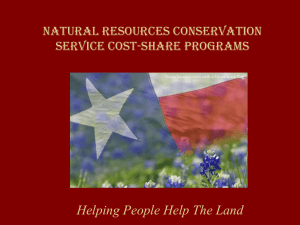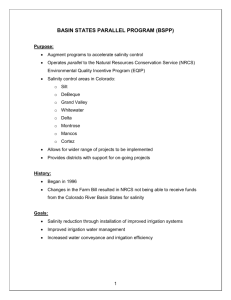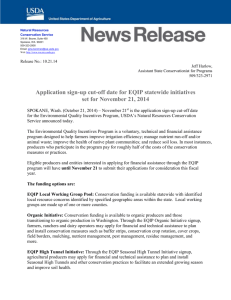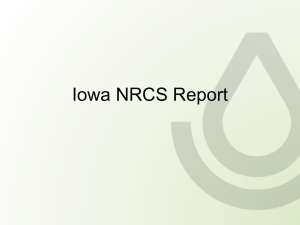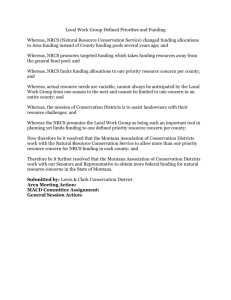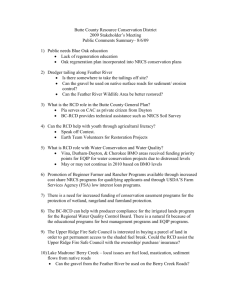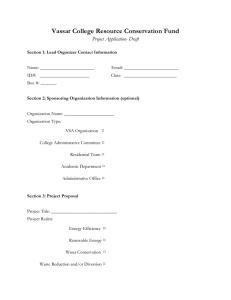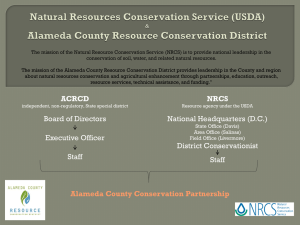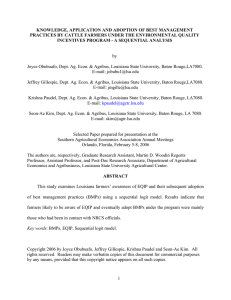How to Apply for EQIP EQIP Application Process
advertisement
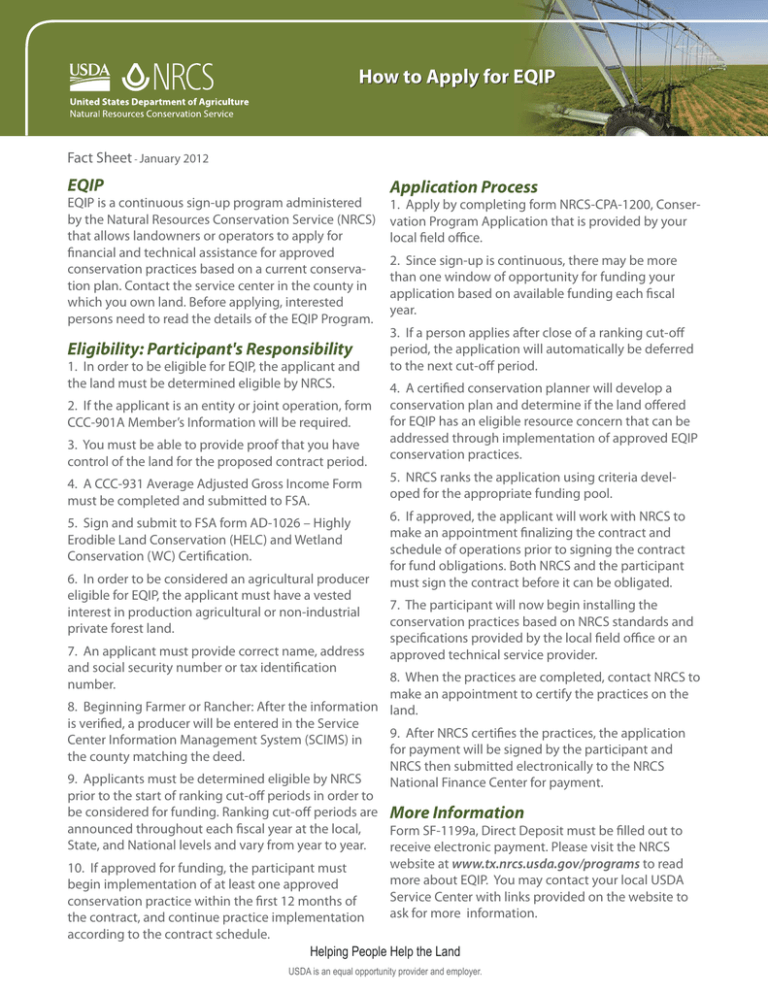
How to Apply for EQIP Fact Sheet - January 2012 EQIP Application Process EQIP is a continuous sign-up program administered by the Natural Resources Conservation Service (NRCS) that allows landowners or operators to apply for financial and technical assistance for approved conservation practices based on a current conservation plan. Contact the service center in the county in which you own land. Before applying, interested persons need to read the details of the EQIP Program. 1. Apply by completing form NRCS-CPA-1200, Conservation Program Application that is provided by your local field office. Eligibility: Participant's Responsibility 1. In order to be eligible for EQIP, the applicant and the land must be determined eligible by NRCS. 2. Since sign-up is continuous, there may be more than one window of opportunity for funding your application based on available funding each fiscal year. 3. If a person applies after close of a ranking cut-off period, the application will automatically be deferred to the next cut-off period. 3. You must be able to provide proof that you have control of the land for the proposed contract period. 4. A certified conservation planner will develop a conservation plan and determine if the land offered for EQIP has an eligible resource concern that can be addressed through implementation of approved EQIP conservation practices. 4. A CCC-931 Average Adjusted Gross Income Form must be completed and submitted to FSA. 5. NRCS ranks the application using criteria developed for the appropriate funding pool. 5. Sign and submit to FSA form AD-1026 – Highly Erodible Land Conservation (HELC) and Wetland Conservation (WC) Certification. 6. If approved, the applicant will work with NRCS to make an appointment finalizing the contract and schedule of operations prior to signing the contract for fund obligations. Both NRCS and the participant must sign the contract before it can be obligated. 2. If the applicant is an entity or joint operation, form CCC-901A Member’s Information will be required. 6. In order to be considered an agricultural producer eligible for EQIP, the applicant must have a vested interest in production agricultural or non-industrial private forest land. 7. An applicant must provide correct name, address and social security number or tax identification number. 7. The participant will now begin installing the conservation practices based on NRCS standards and specifications provided by the local field office or an approved technical service provider. 8. When the practices are completed, contact NRCS to make an appointment to certify the practices on the 8. Beginning Farmer or Rancher: After the information land. is verified, a producer will be entered in the Service 9. After NRCS certifies the practices, the application Center Information Management System (SCIMS) in for payment will be signed by the participant and the county matching the deed. NRCS then submitted electronically to the NRCS 9. Applicants must be determined eligible by NRCS National Finance Center for payment. prior to the start of ranking cut-off periods in order to be considered for funding. Ranking cut-off periods are More Information announced throughout each fiscal year at the local, Form SF-1199a, Direct Deposit must be filled out to State, and National levels and vary from year to year. receive electronic payment. Please visit the NRCS website at www.tx.nrcs.usda.gov/programs to read 10. If approved for funding, the participant must more about EQIP. You may contact your local USDA begin implementation of at least one approved Service Center with links provided on the website to conservation practice within the first 12 months of ask for more information. the contract, and continue practice implementation according to the contract schedule. Helping People Help the Land USDA is an equal opportunity provider and employer. Enviromental Quality Incentiv es Program (EQIP) Incentives Fact Sheet - February 2010 Introduction Applications and Application Ranking On January 15, 2009, the Federal Register, Volume 74, No.10, announced the Environmental Quality Incentives Program (EQIP) rules and guidelines. The program has been reauthorized through 2012. It expands program purposes to include forest management, organic farming and energy conservation benefits. Payments are limited to $300,000 per person or legal entity, unless a project has special environmental significance. The program requires specific portions of funding to be made available for Socially Disadvantaged participants and Beginning Farmers or Ranchers. The program contin­ ues the designation that requires 60 percent of funding go to livestock related practices. Resource Concerns • • • • • • • • • • Animal Waste Management Sheet and Rill Water Erosion Control Grazing Land Productivity Irrigation Water Use Air Quality Fertilizer Use Wildlife Habitat Energy Conservation Tillage to improve Carbon Sequestration Organic Farming Organic farmers will now be qualified for pest man­ agement, nutrient management, forage harvest management, conservation crop rotation cover crop, and prescribe grazing. Under Organic Farming rules, payments are limited to $20,000 per year or $80,000 during any six-year period. NRCS is authorized to cancel a contract if the participant is receiving payments related to organic practices but is not pursuing organic certification or is not in compliance with the Organic Production Act of 1990. Applications for EQIP will be accepted at any time during the year. However, funding cycles will vary based on budgetary allocations. Applications are ranked based on overall cost effectiveness, how effectively and comprehensively the project addresses the designated resource concerns and fulfills the purposes of EQIP, and how well it improves conservation. Payment Limitations The 2008 Act lowers the payment limitation for participants from $450,000 to $300,000 during any six-year period, except for projects having special environmental significance; in such cases the payments will be limited to $450,000. For the purposes of applying the payment limitation and in accordance with the 2008 Act, the six-year period will include those payments made in fiscal years 2009 through 2014. Provides an increased payment rate to historically underserved producers that include beginning, and socially disadvantaged farmers and ranchers. The Act provides advance payments, of up to 30 percent of the anticipated costs to be incurred for the purpose of purchasing materials or services to implement a conservation practice, to historically underserved producers. It establishes a national target to set aside five percent of EQIP funds for socially disadvantaged farmers or ranchers and an additional five percent of EQIP funds for beginning farmers or ranchers. In the event a contract is cancelled on the part of the participant or terminated because of non-compliance, the NRCS state conservationist has the ability to retrieve all or a proportion of the payments. (Continuation) Enviromental Quality Incentives Prog ram (EQIP) Program Irrigation Provisions 1) Reductions of nonpoint source pollution, such as nutrients, sediment, pesticides, or excess salinity in impaired watersheds; the reduction of surface and groundwater contamination; and the reduction of emissions, such as concentrated animal feeding operations. For applications that include water conservation or irrigation efficiency conservation practices, the 2008 Act amendment also requires NRCS to give priority to applications that demonstrate a reduction in water use by the agricultural operation. As a condition of 2) Conservation of ground and surface receiving a higher ranking with the grouping of water water resources. conservation applications, the producer agrees not to use any associated water savings to bring new land 3) Reduction of emissions such as particulate matter, under irrigation production, excluding incidental land nitrogen oxides, volatile organic compounds, and needed for efficient operations. ozone precursors and depleters that contribute to air quality impairment violations of National Program Priorities Ambient Air Quality Standards. The following national priorities, consistent with the statutory resource concerns that include soil, water, wildlife, air quality, and related resource concerns, will be used in EQIP implementation: 4) Reduction in soil erosion and sedimentation from unacceptable levels on agricultural land. 5) Promotion of at-risk species habitat conservation. Helping People Help the Land. USDA is an equal opportunity provider and employer.
